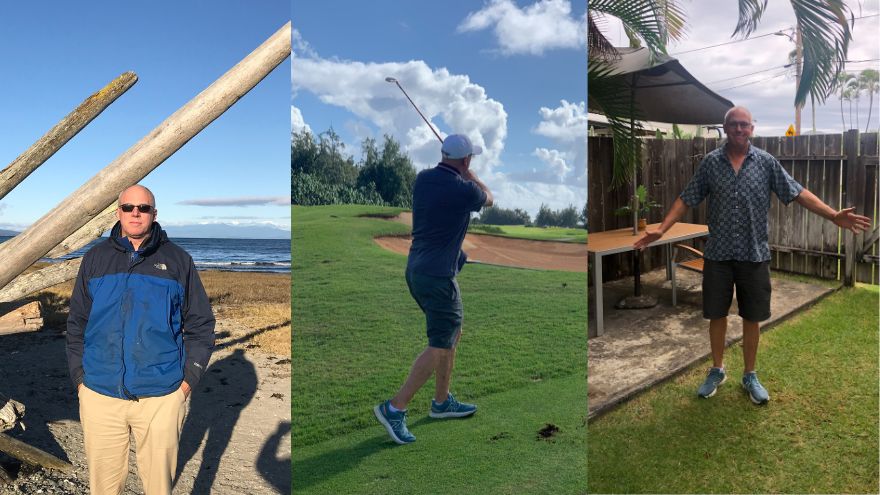Search
Results for 'insurance'
Clear-
Concussion Risks and Prevention
It’s important to be aware of the risk of a concussion, which can have serious health implications. Susan Park, MD, discusses the effects of concussions and how they can be prevented. According to Susan Park, MD, a Renown Medical Group doctor who specializes in sports and family medicine, concussions are a serious issue — especially among children whose developing brains “are more susceptible to brain injury and long-term effects from concussions.” All parents, coaches and athletes, she points out, should be aware of the risks of concussions and take precautions to avoid them. What is a concussion and how does it occur? Dr. Park describes a concussion as a traumatic brain injury resulting from direct or indirect impact to the head or body, during which the brain shakes back and forth in the skull. This may cause some bruising of the brain. In severe cases, traumatic head injuries can cause bleeding, which if not treated quickly, can be fatal. What are the health implications of a concussion? Symptoms of drowsiness and confusion can be a sign of a concussion after a head injury. Some short-term effects may include headaches, dizziness and difficulty concentrating. Long-term concerns can further include mood disorders, sleep disturbance and problems with cognitive function-concentration, which may affect school performance. What sports carry the highest risk of suffering a concussion? Dr. Park notes participation in any impact sport can result in a head injury. But among school-age kids, she treats more concussions from football and soccer than any other sport. However, during the winter months, skiing and snowboarding injuries can be a common cause of concussions Any blow to your head, neck or upper body can result in a concussion with symptoms including, but not limited to, feeling dazed or confused, dizziness, nausea/vomiting or a headache. Initial treatment of concussions varies depending on severity. Rest, avoiding vigorous activity and a reduced school workload help young athletes recover after a concussion. Dr. Park notes that sometimes further imaging and an ER visit will be required. Otherwise, rest from activities is the main treatment, along with not returning to sports activities until further clearance from a healthcare provider.
-
Questions to Ask Your Neurologist at Your First Appointment
When it comes to your neurological health, seeking the expertise of a specialist is crucial. The Renown Institute for Neurosciences provides comprehensive care for complex diseases affecting brain, spinal cord and peripheral nerves. Let us help guide you through the appointment process to ensure a productive and informative first appointment. What to Expect at Your First Appointment at the Renown Institute for Neurosciences Duration and Purpose: Your first appointment will last approximately one hour. This time allows the doctor to ask specific questions, do a thorough neurological exam and discuss your concerns. Specialized Care: You will be matched with a provider who specializes in assessing and treating your specific ailment or condition. This tailored approach ensures that you receive care from an expert who has the specialized interest and expertise to address your needs effectively. Initial Assessment: During your visit, you will first see a medical assistant who reviews your medication history and standard screening questions provided by your doctor. Following this portion of your appointment, the neurologist will ask specific and detailed questions about your condition and conduct a non-invasive neurological examination to evaluate your brain and nervous system functioning. This exam involves painless tests assessing your cognitive function and nerve operation, including tests for sensation, strength and coordination. Treatment: After performing the neurological exam and addressing your questions, the neurologist will review the possible diagnosis and treatment plan, including any medication needs to help with your condition. Finally, your doctor may discuss the role of additional testing, including imaging studies (CT/MRIs), peripheral nerve testing (EMG) or brain wave testing (EEG), which will be scheduled for a later date. Making the Most of Your Visit To make your appointment as beneficial as possible, consider the following tips: Arrive Early: Plan to arrive at least 10 minutes early to fill out any necessary check-in items before your appointment's scheduled start time. This will ensure a smooth and timely visit. Bring Insurance Information: Have your insurance details readily available to facilitate the administrative process. This will help avoid any delays or confusion. Gather Medical Records: If you have received treatment or undergone tests with other healthcare providers relevant to your condition, bring along any medical records or test results. This information will assist your neurologist in gaining a comprehensive understanding of your medical history. Prepare Questions and Concerns: Consider noting the following, which can help you better answer questions the neurologist may ask during your appointment. The frequency, duration and severity of your symptoms. Share information about any medications or treatments you have tried for the condition and the outcomes. Prioritize questions to help the neurologist answer your most significant concerns during the initial visit. Your first appointment with a doctor at the Renown Institute for Neurosciences is an opportunity to receive expert care and gain insights into the best method of treatment for your condition. By understanding what to expect and following the tips provided, you can maximize your visit and be on your way to achieving overall health and wellness.
Read More About Questions to Ask Your Neurologist at Your First Appointment
-
Excellence in Heart Care Changes a Patient's Life
Being diagnosed with a chronic heart condition like atrial fibrillation (A-fib) can shift the course of your entire life. Embracing heart medications and lifestyle changes become your norm, and thanks to advancements in medicine and medical technology, managing the condition can bring you to a new sense of normalcy. But what if a different option was possible – one that would make medications and activity limits a thing of the past? This became the reality for Renown Health patient Richard Preyer after receiving a hybrid catheter ablation. Thanks to the vigilant surgical care of Shining Sun, MD, a cardiologist at the Renown Institute for Heart & Vascular Health, and his compassionate team, Richard has a new lease on life. Minimally Invasive with Maximal Results An A-fib patient since 2010 who had been living with an unfinished ablation, the 59-year-old Carson City resident turned to the internet to look for alternate solutions. He had heard that the Renown Institute for Heart & Vascular Health was a top-tier location for cardiovascular care. “I changed health insurance plans through Nevada Health Link to ensure I could see a Renown cardiologist,” said Richard. Choosing a cardiologist was an even easier decision for Richard. Dr. Sun’s introductory Find a Doctor video on Renown’s YouTube channel, where he displayed his expertise and determination, was more than enough for Richard to choose him as his cardiac care leader. At his first visit, Dr. Sun reviewed Richard’s records, and noted his prior unfinished ablation. The nine-hour procedure had been performed several years ago. With the enhanced technologies at Dr. Sun's disposal, Richard was excited at the thought of his life potentially being changed for good – with a minimally-invasive solution. Dr. Sun collaborated closely with Richard’s previous and current care teams – including a surgeon who performed a maze operation on him right before his surgery at Renown, to ensure his hybrid ablation was tailored uniquely to him. “Dr. Sun is clearly a very powerful cardiologist with many connections, and the coordination between his team and my other doctors was great,” said Richard. After working on the exterior of the heart in the first phase of the surgery and the interior of the heart during the second phase, Richard’s hybrid ablation was successful, completing the unfinished portion of his previous ablation. “Fixing A-fib can take one to three ablations, and sometimes it never holds,” said Richard. “That is one of the largest reasons why I am so thankful for this procedure and how it ended up.” Life After A-fib Now comes the long, arduous healing process, right? Not for Richard. With only eight incisions (four on each side of his chest), he was able to remove his bandages after two days, and he healed completely in one week. “I was even back to taking three-mile walks within a week of my operation,” said Richard. No more blood thinners. No more activity limits. And most importantly for Richard, no more heart-stabilizing medications that came with side effects he didn’t enjoy. He attributes his enhanced life to Dr. Sun and his team. “I highly recommend Dr. Sun and everyone that works with him,” he said. “Everyone in the group, from the nurses and anesthesiologists going above-and-beyond to the schedulers who helped me navigate the appointment process, made me have a lot of confidence. Their calm demeanors made so much difference.” Today, Richard now enjoys elongated walks in the northern Nevada outdoors, exotic vacations with his wife and, as he describes, “feeling like I’m in my 40’s again.” Learn more about the region's leader in cardiac health, heart and vascular care here.
Read More About Excellence in Heart Care Changes a Patient's Life
-
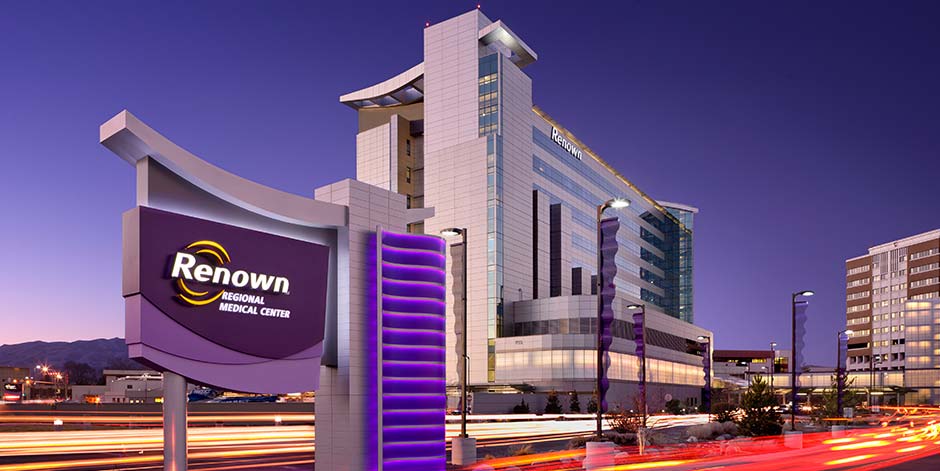 Renown Institute for Heart & Vascular Health - MillRenown Institute for Heart & Vascular Health - MillHours
Renown Institute for Heart & Vascular Health - MillRenown Institute for Heart & Vascular Health - MillHours
Mon - Fri7 a.m. - 4:30 p.m.Sat - SunClosed -
 Renown Health Intensive Cardiac RehabilitationRenown Health Intensive Cardiac RehabilitationHours
Renown Health Intensive Cardiac RehabilitationRenown Health Intensive Cardiac RehabilitationHours
Mon-Fri8 a.m. - 5 p.m.Sat-SunClosed -
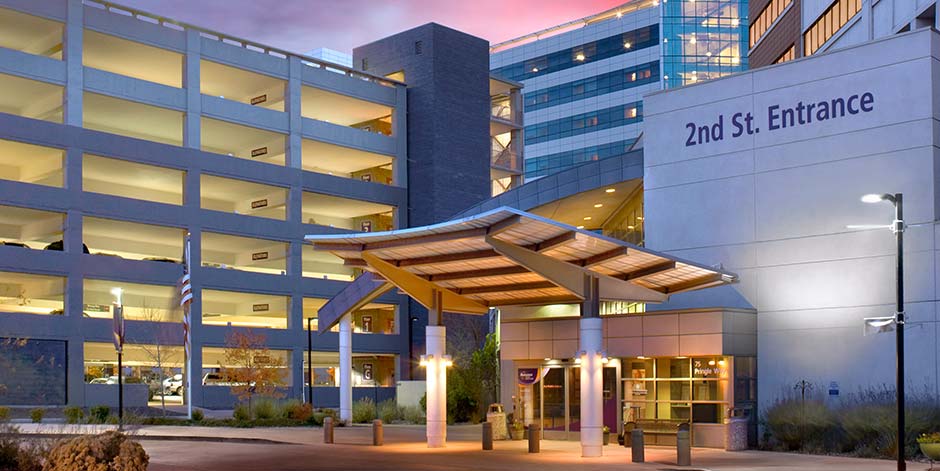 Renown Institute for Heart & Vascular Health - Center CRenown Institute for Heart & Vascular Health - Center CHours
Renown Institute for Heart & Vascular Health - Center CRenown Institute for Heart & Vascular Health - Center CHours
Mon-Fri7 a.m. - 5 p.m. (By Appointment Only)Sat-SunClosed -
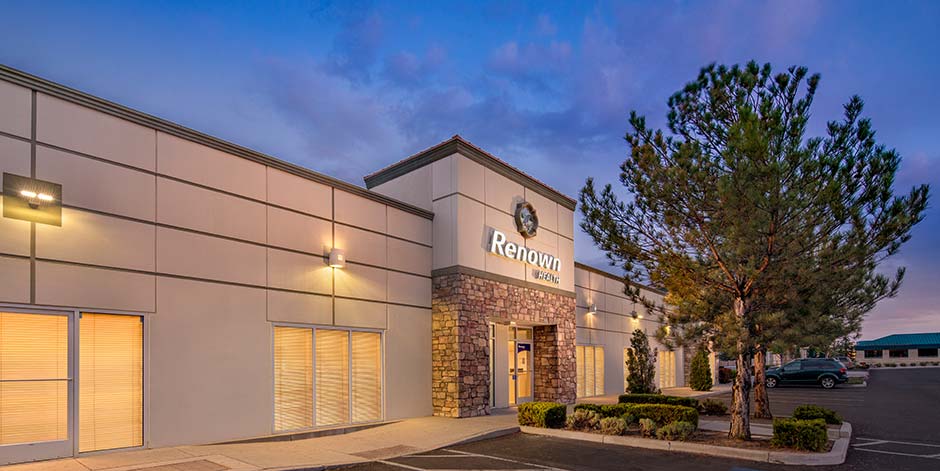 Renown Institute for Heart & Vascular Health - South CarsonRenown Institute for Heart & Vascular Health - South CarsonHours
Renown Institute for Heart & Vascular Health - South CarsonRenown Institute for Heart & Vascular Health - South CarsonHours
Wed8 a.m. - 4 p.m.Thu-TueClosed -
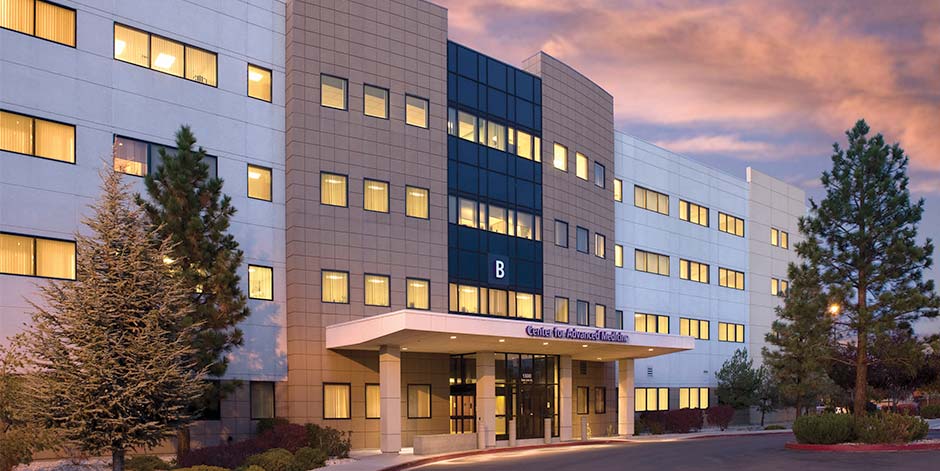 Renown Institute for Heart & Vascular Health - Center BRenown Institute for Heart & Vascular Health - Center BHours
Renown Institute for Heart & Vascular Health - Center BRenown Institute for Heart & Vascular Health - Center BHours
Mon-Fri8 a.m. - 5p.m.Sat-SunClosed -
 Renown Institute for Heart & Vascular Health - FallonRenown Institute for Heart & Vascular Health - FallonHours
Renown Institute for Heart & Vascular Health - FallonRenown Institute for Heart & Vascular Health - FallonHours
Mon-Tue8 a.m. - 4 p.m.WedClosedThu-Fri8 a.m. - 4 p.m.Sat-SunClosed -
 Renown Institute for Heart & Vascular Health - Double RRenown Institute for Heart & Vascular Health - Double RHours
Renown Institute for Heart & Vascular Health - Double RRenown Institute for Heart & Vascular Health - Double RHours
Mon-Fri8 a.m. - 5 p.m.Sat-SunClosed -
Alzheimer's Safety Tips for Caregivers to Know
November is National Alzheimer’s Disease Awareness Month. At Renown Health, we know that Alzheimer's safety for your loved one is a priority, as the symptoms can sometimes lead to unsafe situations. We asked Dr. Jonathan Artz – a neurology physician with Renown Health and an assistant professor of clinical neurology at the University of Nevada, Reno School of Medicine – for tips on keeping loved ones safe and secure. According to the Alzheimer’s Association, Alzheimer’s disease affects safety in various ways, specifically due to body and brain adjustments. These changes can include: Judgment, including forgetfulness Sense of place – getting lost on the way home Behavior – being suspicious or fearful Body difficulty – losing balance Sensing ability – noticeable sensitivity in hearing, seeing or temperature Dr. Artz gives us four major tips to ensure your loved one’s safety as you both navigate this disease together. Watch for Wandering Those experiencing Alzheimer’s disease tend to wander and get lost. Try the following tips to reduce the risk of wandering: Get your loved one an ID bracelet and have them wear it at all times. You can also enroll your loved one in “Wandering Support.” Install door chimes so you know when exterior doors are open. Ask neighbors to call you if they see your loved one out alone. Go with your loved one when they insist on leaving the house. Don’t argue or yell. Instead, use distraction or gentle hints to get them to return home. Discourage Driving Driving can be unsafe for someone with this disease. With this in mind, ask a doctor whether it’s safe for your loved one to drive. For example, on a case-by-case basis, there are certain situations where doctors are required to report individuals with particular cognitive impairments, wherein a form of a driving assessment will be recommended. Limit access to the car. Keep the keys with you or lock them away. Ask an authority figure, such as an insurance agent or a doctor, to tell them not to drive. Adult-Proof Your Abode A simple living space is a safe living space. This means reducing clutter and removing any issues that may pose a safety concern. You may also want to get advice from an occupational therapist (home safety expert). Keep in mind that some changes may not be needed right away. Focus on major safety concerns first. Try the following tips: Add lighting (or glow-in-the-dark tape) to brighten dark areas, including stairways and halls. Use color contrast or texture indicators for dials, knobs and appliance controls. Remind your loved one not to carry items while walking to avoid a fall. Remove sharp objects from drawers and countertops. Avoid using small throw rugs or doormats, as they are easy to trip on. Move frequently used items so that they are easy to reach. Lock away alcohol and tobacco products, as they are not recommended for dementia patients. Install handrails in the shower, tub and near the toilet. Bathroom falls are especially common. Adjust the setting on your hot water heater so water does not scald. Those with Alzheimer’s can lose their sensitivity to temperature. Move and lock up hazardous chemicals and cleaning supplies, such as bleach and insecticides. Disable and remove guns or any weapons. Supervise any medication taken by your loved one. Promote a Positive & Healthy Lifestyle Continually emphasize the strengths of your loved one by promoting participation in meaningful activities, wellness visits and healthy habits to help them improve their well-being. Here are some ways to keep them physically and mentally active: Maintain regular vision and hearing screenings and make necessary adaptations. Establish a routine for daily activities. Encourage participation in self-care and leisure activities. Work with your loved one’s doctor to establish a healthy diet. Ensure proper hydration. It may help to set reminders for your loved one to drink fluids. Encourage regular exercise. Exercise delivers oxygen to the brain, improving brain health. Promote good sleep habits. Good quality sleep can increase overall brain health and has been associated with improving memory, attention and concentration. Resources and support are available with the Renown Memory Disorders Program. Providers within this program are specifically dedicated to treating several different memory-related disorders. Memory Disorders Resources & Support.
Read More About Alzheimer's Safety Tips for Caregivers to Know
-
Leading Experts Convene in Tahoe To Focus On Scientific Advancements And The Prevention Of Cardiovascular Disease, The #1 Cause Of Death Globally
Three-day medical education conference advances research, education, prevention and treatment. Physicians and medical professionals from across the country will convene in Lake Tahoe from Friday, Nov. 4 to Sunday, Nov. 6 to explore the most recent advances and established guidelines for the diagnosis, treatment and prevention of cardiovascular disease, diabetes mellitus, stroke and diseases or problems associated with heart disease. Hosted by Renown's Institute for Heart & Vascular Health and the Nevada Academy of Family Physicians, the 32nd annual three-day Trends in Cardiovascular Medicine conference will bring together national experts to explore challenges and solutions to cardiovascular diseases, the leading cause of death globally, taking an estimated 17.9 million lives each year. "The driving force behind this collaborative event is the shared missions of all our organizations, across the country, to advance progress in cardiovascular research, education, prevention and treatment," says Jayson Morgan, MD, FACC, Director of Cardiovascular Services at Renown. "We will be joined by colleagues from across the country including Mayo Clinic College of Medicine and Science in Rochester, UC San Francisco School of Medicine, David Geffen School of Medicine at UCLA, University of Washington Medical Center, University of Chicago Medicine and locally- with experts from Renown's Institute for Heart & Vascular Health/UNR Med and Northern Surgical Associates - to discuss contemporary trends in providing excellent cardiovascular care and prevention." New research will be presented each day from experts across the country, including the following topics: “What the Fentanyl? Making Sense of a Deadly Epidemic” “COVID-19: Return to Sport or Strenuous Activity Following Infection” “Management of Type 2 Diabetes: Evolving Data, Evolving Guidelines, Evolving Practice” “Coronary Microvascular Disease in Women: Signs, Symptoms, Evaluation and Treatment” “Lipoprotein (a): A Risk Factor for Atherosclerosis and an Emerging Therapeutic Target” “Gut Feeling: The Increased Importance of GLP-1 Therapies for Personalized Obesity Management” "Primary Care Perspectives: Peripheral Vascular Disease” “Prevention of Atrial Fibrillation and Sudden Cardiac Death in Women” “Clinical Practice Guidelines for the Management of Heart Failure in 2022: What Do I as a Primary Care Provider Need to Know?” “Can a Patient be Low Risk without a Calcium Score?” “Obesity & Cardiovascular Disease Risk Reduction: How Does Bariatric Surgery Change the Landscape?” To make an appointment with a provider at Renown's Institute for Heart and Vascular Health, request that your primary care provider make a referral. For more information on Renown's Institute for Heart and Vascular Health, visit renown.org/Health-Services/Heart-Care. About Renown Health Renown Health is Nevada’s largest, locally governed, not-for-profit integrated healthcare network serving Nevada, Lake Tahoe and northeast California. With a diverse workforce of more than 7,000 employees, Renown has fostered a longstanding culture of excellence, determination and innovation. The organization comprises a trauma center, two acute care hospitals, a children’s hospital, a rehabilitation hospital, a medical group and urgent care network, and the locally owned not-for-profit insurance company, Hometown Health. Renown is currently enrolling participants in the world’s largest community-based genetic population health study, the Healthy Nevada Project®.


